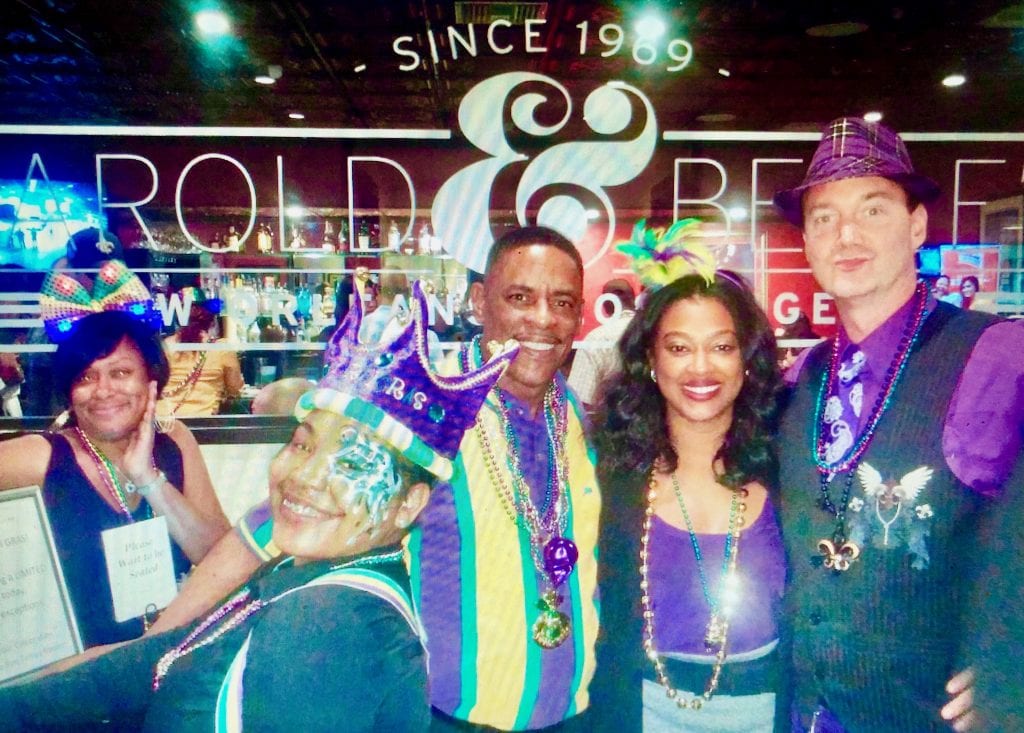
Much of my small-town Louisiana childhood was spent taking French classes at school, shelling field peas on Grandmama’s front porch, scaling perch that Uncle Herbert brought over by the bucketfuls and daydreaming about one day moving to New Orleans, which sat like a dream a few hours east of my hometown. When, in my mid-20s, I landed a reporting job at New Orleans’ daily newspaper, I moved there and vowed never to leave. The city pressed upon my still-forming sense of identity and left an indelible mark.
What is New Orleans to me? It is poetry and potholes, roux and humidity, banana trees and wraparound porches. It’s live jazz in a hole-in-the-wall bar and catching a tangle of Mardi Gras parade beads from my own front porch. New Orleans is wealth and poverty, sometimes at war, sometimes dancing together in the streets. It is Creole, Vietnamese, Cameroonian, Haitian, Italian, German and Gambian cuisine shining in all their singular glory, then marrying each other in myriad palate-bursting fusions.
Who would want to leave such a place? But, eventually, I did. I married a Yankee – a vegetarian from New York City – and in 2001, moved with him to L.A. Our marriage didn’t last, but our friendship did. He’s still a vegetarian, while I’ve slowly returned to my culinary roots, increasingly nostalgic for New Orleans, its people and its ways.
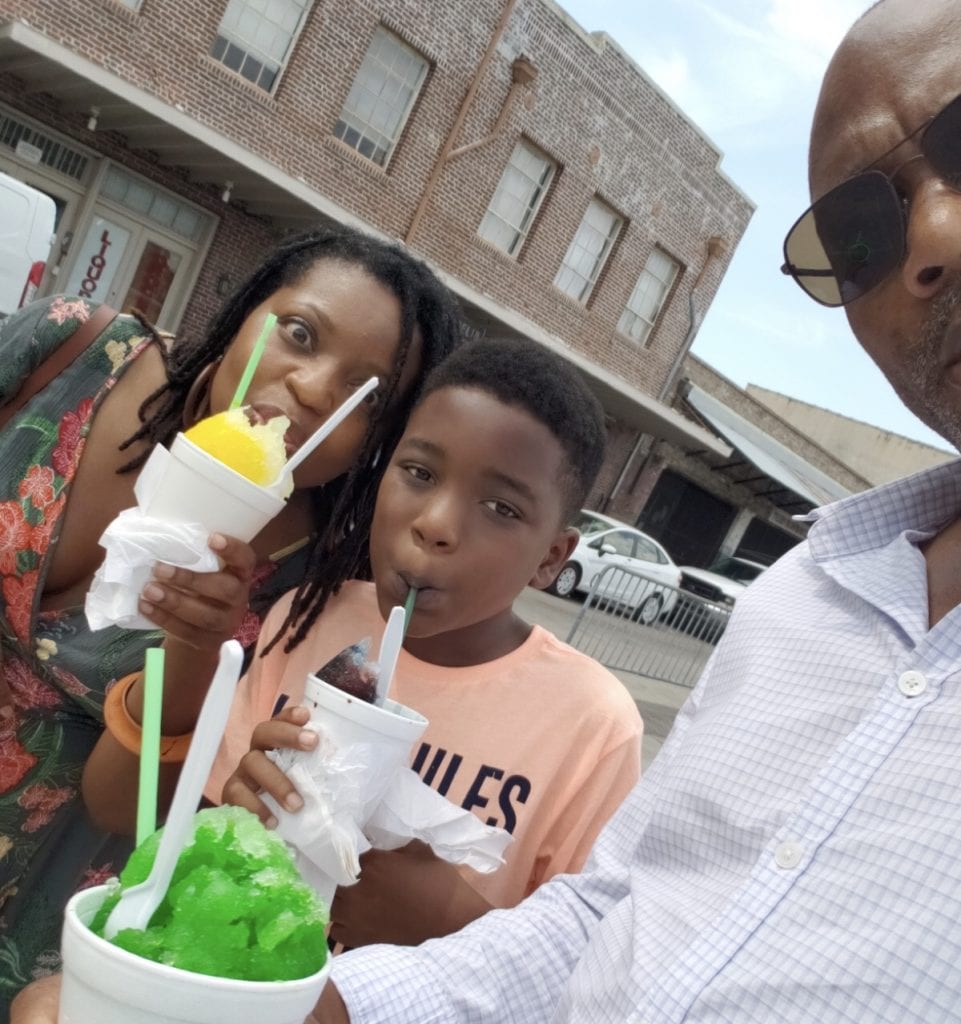
“Why did you ever leave here, Mommy?” my son, who is 11, asked during a family trip to New Orleans last July. He was climbing one of my favorite old live oak trees in City Park, the silvery Spanish moss hanging around him as he looked down at me. The truth is, I love L.A. as well. In the 18 years I’ve lived here, it has become home in fundamental ways: remarriage, motherhood, home ownership, friendships.
And, I have discovered wonderful glimpses of Louisiana in L.A. From Long Beach to Chatsworth, the spirit of New Orleans can be found at food festivals, restaurants and Mardi Gras celebrations. There is even an organization called the Louisiana to Los Angeles Organizing Committee, Inc. (LA-LA), launched in 1988 to “bring together the city’s considerable Louisiana-born and -bred population.” Wynton Marsalis, Kermit Ruffins, Trombone Shorty and a host of other New Orleans musicians recently performed at local venues. Museums and galleries, including Art + Practice and the Fowler Museum, have exhibited works from New Orleans photographers.
In honor of Mardi Gras (Fat Tuesday, the final and grandest day of carnival season, the day before Lent, is March 5 this year), I embarked on a quest to get my “New Orleans fix” in L.A. It wasn’t a stretch at all.
They’ve Been Here
By the time I moved to L.A. in 2001, scores of Louisianians had already made this pilgrimage, moving here in droves during the 40s, 50s and 60s to explore better, more equal opportunities.
New Orleans native Ed Wheeler, owner of La Louisanne, one of three New Orleans-themed eateries within walking distance of my South L.A. home, says that after his release from the Army in 1962, he decided to stop off in L.A. to visit an aunt before returning to New Orleans. “I never made it back to New Orleans,” he says, laughing.
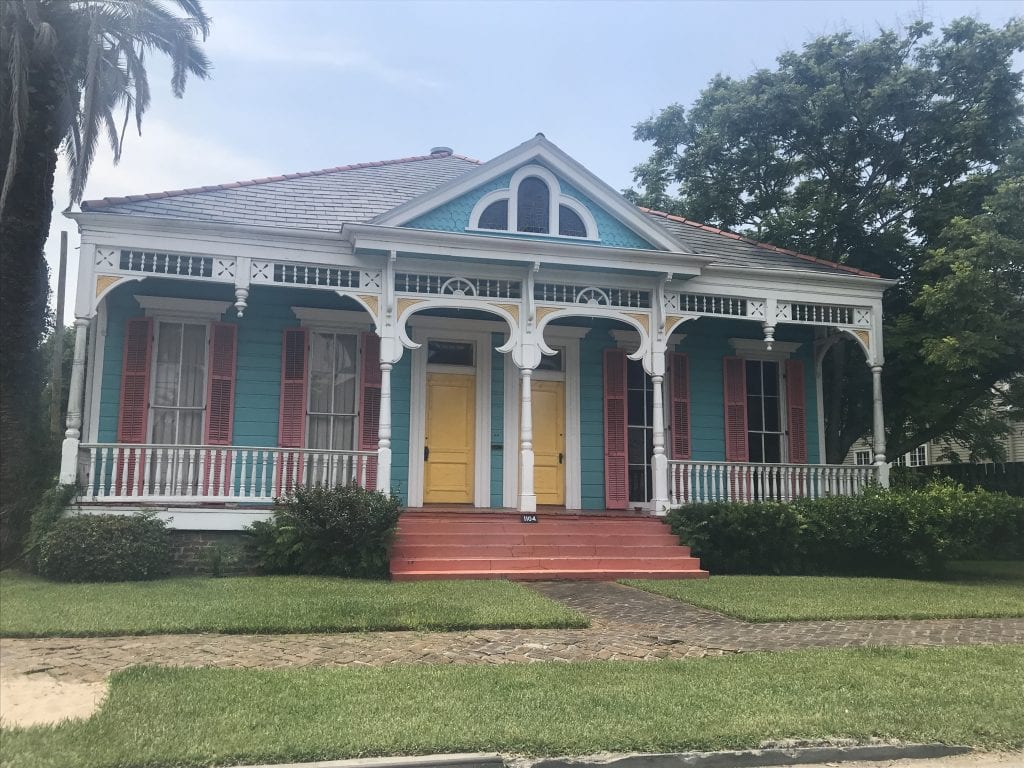
“I was born and raised there, but I think the reason so many of us came to Los Angeles is that we were tired of going to the back of the bus,” he says. “I’m the great grandson of slaves that got off the boat in New Orleans way back. When I was coming up, there was a restaurant named La Louisiane that we [black people] weren’t even allowed to go in and be a dishwasher at back in those days. So, I decided to name my restaurant in Los Angeles La Louisanne. I saw that there was a market for authentic Creole food here. So many of us were moving here, not just one person at a time, but whole families, then more families. It was a domino effect.”
La Louisanne has sat at the corner of Slauson Avenue and Overhill Drive for 30 years. It lights up the corner at night with its purple, gold and green neon signs – one in the boot shape of Louisiana, the other advertising its Creole cuisine and nightly jazz. Sharing the corner are Orleans & York, a po-boy go-to, and the The Snoball Shop, where you can order all manner of syrupy, icy goodness and even get it creamed with condensed milk, the way they do it down in New Orleans. When I dropped in to order the Mardi Gras snoball on a Saturday in February, the line was out the door. I chatted up a woman next to me who, it turns out, is from Lake Charles, La. She was ordering a funnel cake and was going to pretend it was beignets, that famous powdered-sugar-dusted concoction you must get from Café du Monde when you visit the Big Easy.
Just a few miles east of my neighborhood’s Little Louisiana corner is another one of L.A.’s Creole restaurant staples, Harold and Belle’s, which opened 50 years ago in the area where it still stands, Jefferson Park, a neighborhood teeming with Louisianians back then. Like other New Orleans-themed restaurants in the area, Harold & Belle’s will be hopping with energy on Fat Tuesday. La Louisanne will also have a Fat Tuesday celebration that includes a second line, the New Orleans style parade that follows a brass band while participants dance and twirl parasols and handkerchiefs. Bayou Grille in Inglewood will host a crawfish boil.
New Orleans as Teacher
My dear friend, the late musician Harold Battiste Jr., was born and raised in New Orleans and moved to L.A. in the 1960s, spending 30 years of his career here before he eventually returned home. In L.A., Harold continued the legacy of his cutting-edge A.F.O. Records, produced music for the likes of Ellis Marsalis, Sam Cooke and Dr. John, served as the musical director of the Sonny & Cher Show and, later, served as the director of jazz studies at the Colburn School of Music in Downtown L.A. In his book, “Unfinished Blues: Memories of a New Orleans Music Man,” Harold wrote that he viewed his role at Colburn as “an opportunity to show my students how to play by ear.”

That is the generosity of Louisianians: to share a dish, a style or a piece of music that they’ve “seasoned by sight” or “played by ear” or “thrown together” – and to, if they’re feeling extra generous, teach you how to develop such a sense of intuition yourself.
Angeleno journalist and Grammy Award-winning writer Lynell George, author of “After/Image: Los Angeles Outside the Frame,” writes exquisitely about music (including Battiste’s work) and place. As the daughter of a New Orleans-to-L.A. transplant, George finds herself increasingly obsessed with New Orleans since her mother died in 2009. George’s mother loved L.A., but kept New Orleans close to her heart, playing its music in her home and never letting go of regional phrases like “making groceries” for grocery shopping and “neutral ground” for median.
George, who, like many children of the “Great Black Migration,” grew up traveling back and forth to New Orleans to visit family, says her mother taught her how to cook signature New Orleans dishes. “We would cook together, and her way of teaching was that she got a pot and you got a pot, a smaller pot, and you would sit down together and do it together. We deveined shrimp together. She taught me to eyeball things. I’ve made pralines, beignets from scratch, jambalaya, etoufee, I’ve done stuffed mirliton …”
Quest for Authenticity
George has been more loyal to keeping Louisiana dishes alive in her home than I have in mine. I may cook up a pot of gumbo once every two years, but I don’t generally like to be in the kitchen too long. Lolis Eric Elie, another New Orleans transplant in L.A. and one of my former newspaper colleagues, says that in the six years he’s lived here, he’s only made gumbo once. But if you want his mama’s recipe, you can get it from his cookbook, “Treme: Stories and Recipes from the Heart of New Orleans,” the companion book to the HBO series “Treme,” on which Elie was a staff writer and story editor.
“Gumbo is hard. Gumbo is a ritual,” says head chef Marcus Christiana-Beniger, who opened The Little Jewel of New Orleans in Chinatown with his wife, Eunah Kang, in 2014. “Everyone has their way of doing it, but if you’re doing it right, it’s a three-day affair. You need one day just for the stock.”
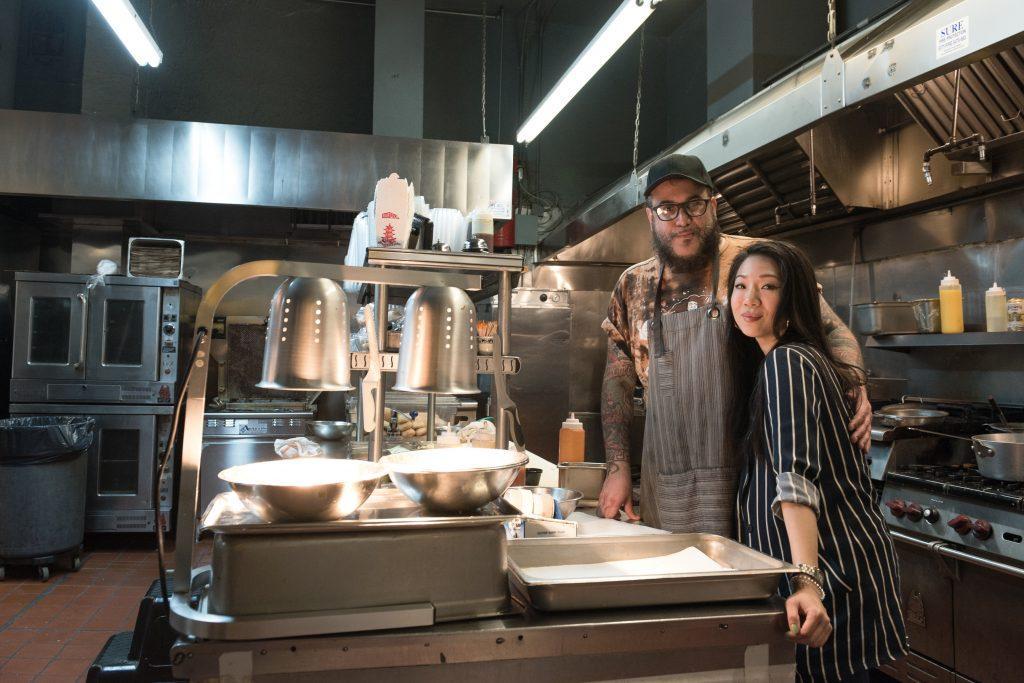
Nearly every Fat Tuesday since Little Jewel opened, I’ve dropped by to order po-boys, hear Zydeco blaring from speakers and even to buy a few packages of boudin – pork casing stuffed with rice, spices and sausage. They also sell king cake during Mardi Gras season, but you have to get your orders in early. Future plans include a full bar called The Swamp Room, which will open next door.
Christiana-Beniger moved from New Orleans to L.A. 19 years ago. He loves his hometown, where his grandmother taught him to cook to keep him out of trouble, but he prefers “being a New Orleanian outside of New Orleans more than I enjoy being one there.”
“I love introducing people to New Orleans,” he says. “A lot of people are homesick for a New Orleans that they say don’t exist anymore, and they blame it on the storm, but I think that’s shortsighted. I grew up hearing how great New Orleans was before [hurricanes] Besty and Camille. New Orleans is what you make of it. Its influence is so culturally diverse and always has been. It’s German people screwing up French bread and making it better. It’s Creoles, blacks, French, Spanish, Irish, El Salvadoreans, a constant influx of people adding their own flavor not only in the cooking, but also in the arts.”
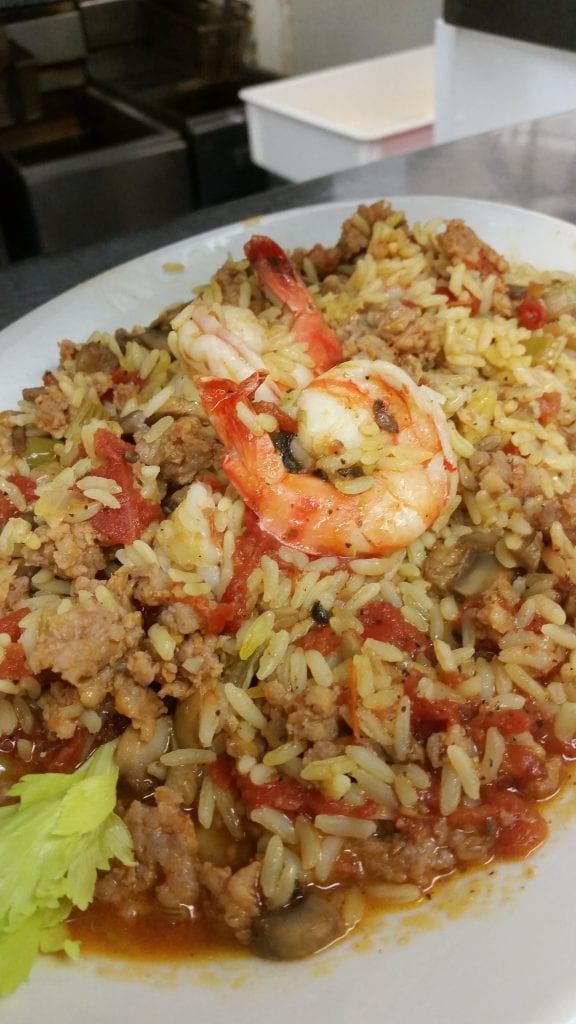
The Little Jewel’s exterior is flanked by a big green-and-white awning; inside, half of the business is set up like a store, with all manner of Louisiana delights – old-fashioned candies, a variety of hot sauces, moon shine syrup, Zapp’s kettle-cooked potato chips, Abita root beer and, delightfully, dried Camellia red beans (and crowder and field peas). The other half houses the cheery dining area with an oversized chalkboard covered in bright-chalked menu items that make your mouth water: jambalaya, muffulettas (the New Orleans-style Sicilian sandwich), fried oysters, whiskey sauce bread pudding …
Even other Louisiana chefs, who can be a critical bunch, laud Little Jewel for “getting it right.”
“If people are looking for super-traditional southern Louisiana food, that man is doing the Lord’s work,” drawls Josh Kopel, a Baton Rouge native and owner of three Southern/New Orleans-themed establishments: Preux & Proper and South City Fried Chicken in Downtown L.A. and Five0Four Bar in Hollywood. Preux & Proper, opened in 2015, is a bright and breezy interpretation of New Orleans and the South, in contrast to The Little Easy (also opened in 2015 in Downtown L.A.), which gives off sultry and moody vibes. Both serve up Dirty South-inspired cocktails and Sunday brunch.
Kopel says that in all his ventures, he aims to bring New Orleans hospitality and a sense of optimism to L.A. patrons. “In New Orleans, a youthful spirit defies all logic,” he says. “They turned an epic Superbowl failure into one of the biggest block parties. Despite all that city has been through, it’s a class of people who manifest their own reality in a truly amazing way. I wanted to bring some of that to Los Angeles.”
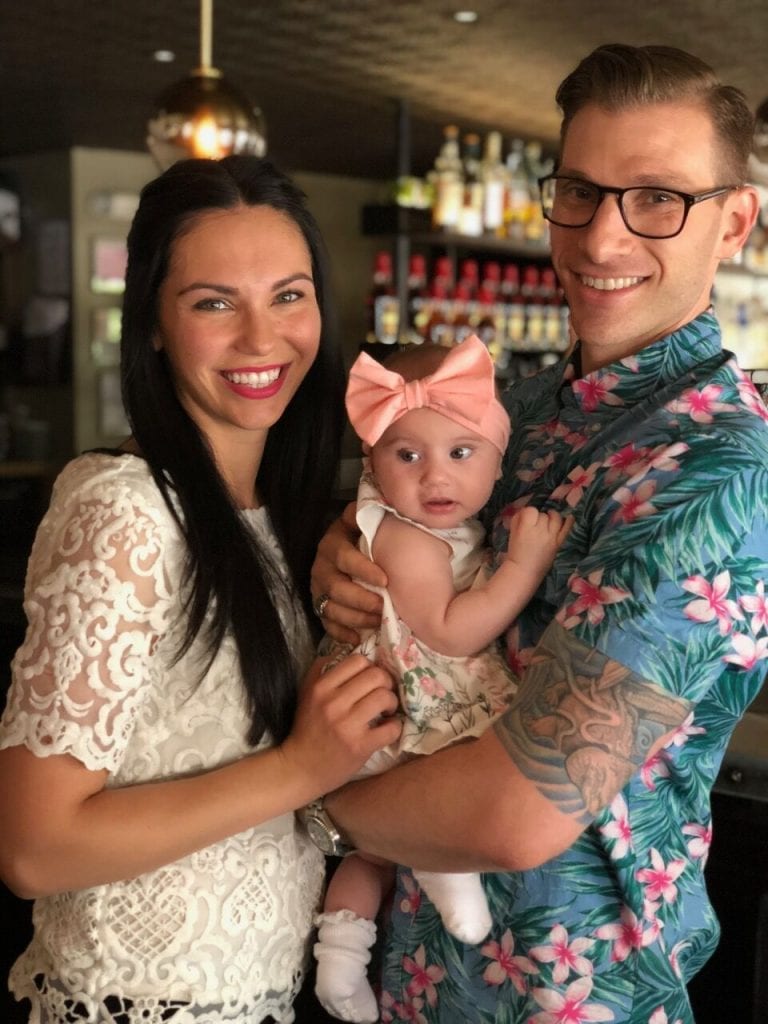
To be sure, these Los Angeles establishments are not without critics. Known the world over for our food, we Louisianians can be some of the toughest food critics. “Oh, Louisianians are the worst,” Kopel says, laughing. “I had someone knock on my kitchen door one night and say, ‘Just wanted to let you know, it was a delightful meal. Here’s what you did wrong.’ If mine doesn’t taste like your grandma’s, then it’s wrong. You can’t compete with other people’s families.”
Christiana-Beniger says he’s gotten the not-like-my-grandma’s remarks as well, but understands that for a people whose state has landed at the bottom of so many lists, our food and culture are our pride and joy. The key to making the food as authentic as you can, he says, is, “don’t compromise. I get the bread, dammit, from there; I get the mayonnaise from there. I only use Blue Plate mayonnaise on my po-boys.” And when he can’t source oysters from down South, or at least from a supplier whose oysters taste like they come from the brackish waters back home, he won’t serve them. His po-boy bread hails from New Orleans’ 123-year-old Leidenheimer Baking Company, a bread deity.
Jessica Huling, third-generation owner of Les Sisters Southern Kitchen & BBQ in Chatsworth, has never lived in New Orleans (“I’m a straight-up Valley Girl,” she says), but she inherited her restaurant from her family and takes great pride in it. When she took over in 2014, she and her business partner traveled to New Orleans to “test the authenticity” of Les Sisters’ food. They ate at restaurants, took a swamp tour, visited plantations and other historical sites. The trip resulted in them tweaking some of their recipes, such as their red beans and rice, but “mostly, I was pleased with our product,” Huling says.
Lagniappe (Something extra)
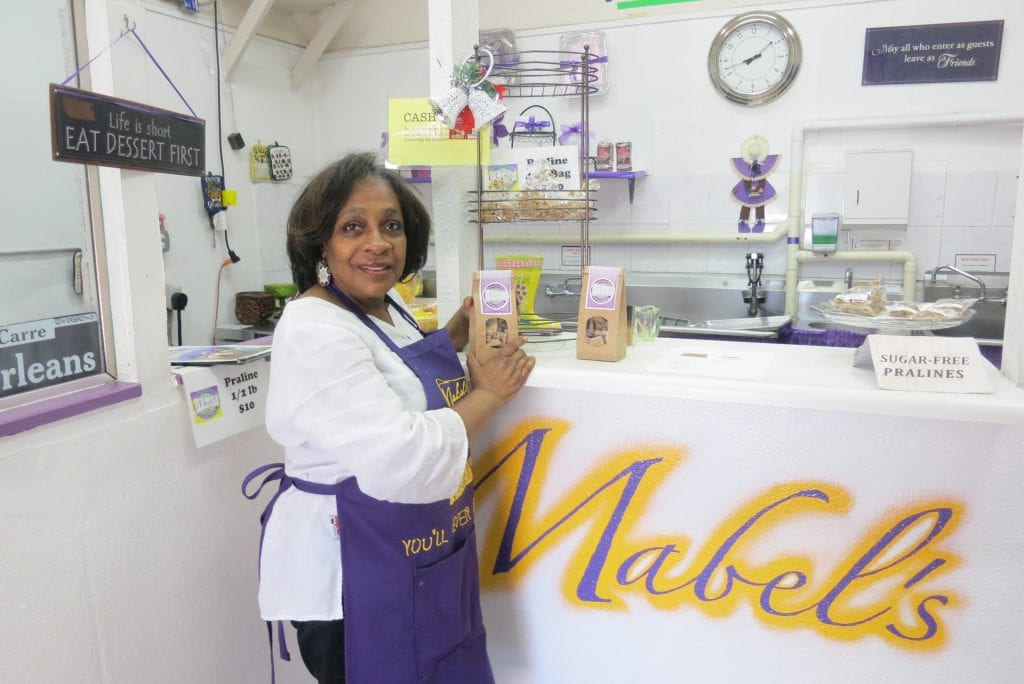
If you want creamy pralines that taste like down-home (and real Louisiana banana pudding, for that matter), head to Mabel’s Pralines in Downtown Long Beach. Saundra Christmas, “The Candy Lady,” is the owner, and since 2006, she’s been selling a version of the “pecan candy” her mother, Mabel, taught her to make when she was a girl growing up in Baton Rouge. After heavy fall rains would knock the pecans off the trees in their backyard, little Saundra would gather the pecans in the wooden wagon her father made for her, then shell them for the candy.
One day, Christmas says, she plans to return to Louisiana to retire. “There’s such a sense of family, community and culture down there,” she says. “People sit out on their porches and they wave at you like they know you.”
“That is nice,” I tell her, “but don’t forget about the heat … and the mosquitoes.”
“I forgot about the mosquitoes,” she squeals. “And California really does have the best weather. I don’t want to live down South in the summertime. My goal is not to be there from May to September.”
I listen to her chuckles and memories and feel at peace, at home. Even if I never live in New Orleans again, I can invest in it by visiting more frequently. And I can find ways to honor the people of Louisiana who make up part of the pulse of L.A.
Cassandra Lane is Managing Editor of L.A. Parent.





























